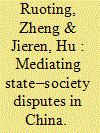| Srl | Item |
| 1 |
ID:
175162


|
|
|
|
|
| Summary/Abstract |
Where popular contention in China is concerned, third parties are not merely supporters of protesters but also allies of the state. Through quantitative and qualitative methods, this article uses an actor-centred perspective to explore the dual role of Chinese lawyers in state dispute resolution projects. When providing legal counselling services to the public, lawyers adopt selective strategies and channel non-political cases into legal channels while keeping political cases within the political arena. When handling social disputes for the government, however, they apply professional diagnoses and legal persuasion, and intervene through mediation and negotiation. Three factors constrain the effectiveness of Chinese lawyers during dispute resolution. These are the limited access to cases, the dilemmas inherent in acting simultaneously both as a third party and as a state agent, and the restricted influence of lawyers over the final resolution of social disputes. This article argues that the selective responses of Chinese lawyers during legal counselling and strategic defence of state power in dispute resolution make them a governance tool for stability maintenance. Their participation contributes more to legal repression than to legal development in contemporary China.
|
|
|
|
|
|
|
|
|
|
|
|
|
|
|
|
| 2 |
ID:
189501


|
|
|
|
|
| Summary/Abstract |
How do state authorities cope with popular contention under authoritarian legality? Based on ethnographic fieldwork and legal repression cases in China, this article highlights that conflicting rules and signals regarding contention management can impose considerable pressure on governments and motivate them to respond cautiously, even though the prevailing rhetoric of law-based governance provides a convenient basis on which authorities can legitimize their coercive actions. This study further theorizes a discreet pattern of government reaction under authoritarian legality – progressive legal repression – that rests on bureaucratic processing to overcome political uncertainty and lower potential risks before formally employing criminal sanctions to achieve domination. Instead of directly using criminal penalties to deter unruly protesters and potential dissenters, the preferred state action is to induce them to engage in available legal-bureaucratic procedures. By reconceptualizing protesters’ claims and behaviour as unreasonable and signalling fulfilment of responsibilities, bureaucratic practices help officials to reduce the risks of damaging their political image and receiving disciplinary action, encouraging them to deploy legal repression. This study reveals more complicated dynamics of state repression under authoritarian legality and emphasizes the important effects of procedural practices on governmental responses and the regime's stability.
|
|
|
|
|
|
|
|
|
|
|
|
|
|
|
|